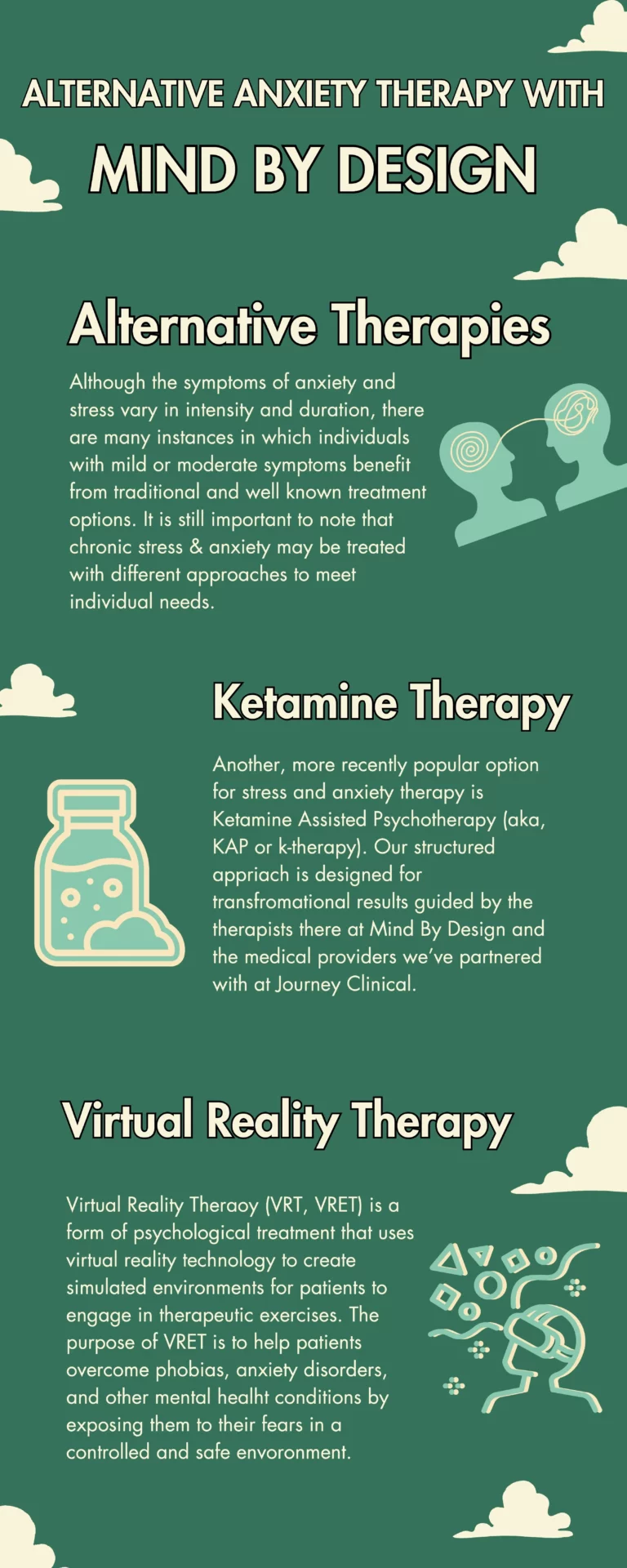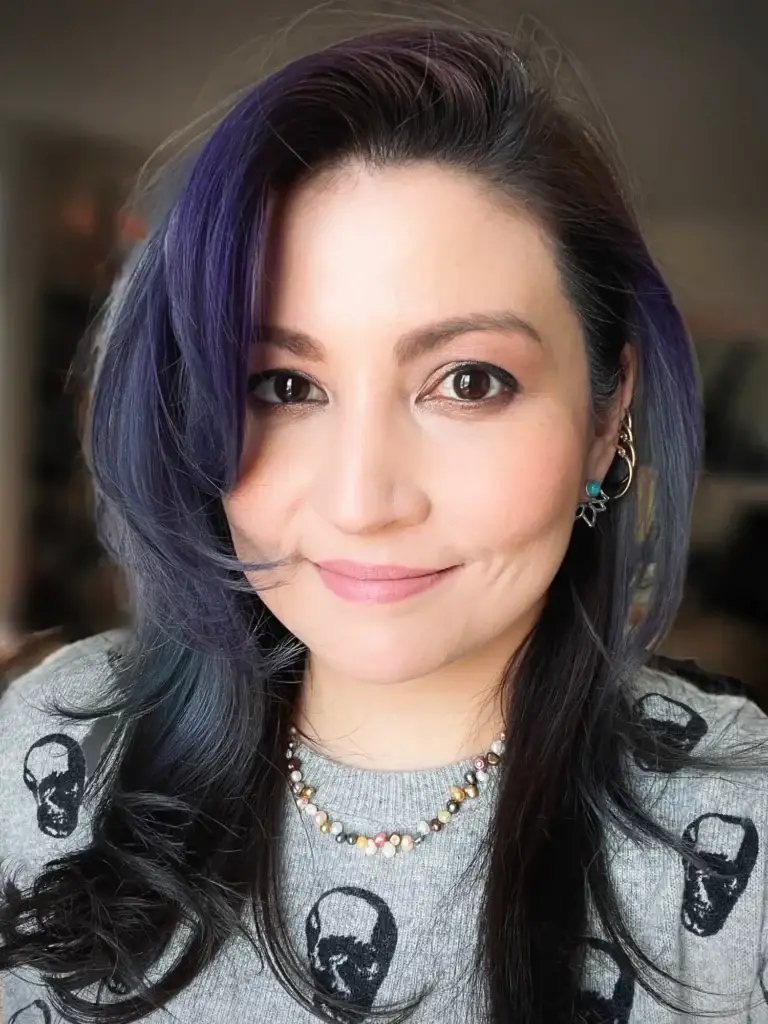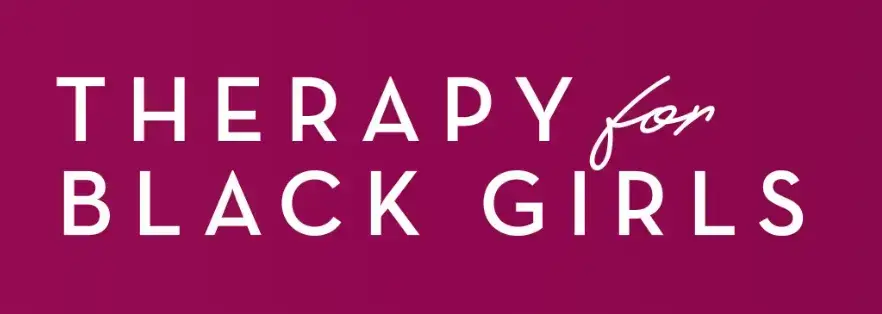Unique Options Used in Therapy For Anxiety in NJ
From first-timers, to people who’ve been going to sessions for years, starting therapy for anxiety can be intimidating, but understanding why you’re there and how you will grow from it can make it a little less scary. Some different types of anxiety include Generalized Anxiety Disorder (GAD), Phobias (such as Emetophobia or Agoraphobia), and Panic Disorder, OCD, and Pervasive Anxiety Disorders.
There are treatment options available for all conditions, but some of Mind By Design’s therapies for anxiety are Cognitive Behavioral Therapy (CBT), Mindfulness Based Therapy For Social Anxiety, DBT For Relationship Anxiety, Ketamine Therapy For Anxiety, and Virtual Reality For Anxiety. This may seem like a long list of possibilities for diagnoses and treatment, but there’s no need for you to be able to identify which condition and solution best suit you. This is where the professionals come in, but until then, this is some basic information about anxiety disorders. .
Types of Anxiety Disorders
Generalized Anxiety Disorder (GAD)
Generalized Anxiety Disorder is a condition that causes someone to have long-term feelings of anxiety and irrational worry. Many are able to relate to feelings of anxiety when it comes to things like personal relationships, public speaking, and more, but GAD may be a possibility when these feelings begin to impair a person’s functioning for a prolonged period of time. GAD is one of the most common mental disorders.
Phobia & Fears
A phobia can come in many different forms as an uncontrollable and irrational fear of a certain object, activity or situation. When someone with a phobia is faced with that thing, they experience an intense fear that can last for minutes or longer when there is no true danger present. An example of this is social phobia, in which people experience extreme anxiety in social situations, and will go to lengths in order to avoid these types of situations.
Panic Disorder
Panic Disorder is when someone experiences frequent unpredictable panic attacks accompanied with worry about it happening again. People panic when put in stressful situations, but Panic Disorder makes those affected have these attacks regularly, sometimes without an obvious trigger.
Obsessive Compulsive Disorder (OCD)
This type of anxiety disorder is led by intrusive and frequent thoughts about something in an obsessive manner, affecting the way someone behaves in their everyday life. Individuals who experience OCD can develop as a result of some ‘fears’ or obsessions that become extremely controlling in their lives as opposed to someone who’s not suffering from OCD. Some of these obsessions could look like a fear of dirt or contamination, a fear of harm, or fear of exactness. The fears or obsessions that people with OCD experience lead them to carry out behaviors to satisfy these obsessions so as to no longer feel distress by them.
Treatments For Various Anxiety Disorders
Expressive Art Therapy promotes emotional growth and healing through a combination of individual psychology and creativity. This is a good type of therapy for those who have trouble articulating their feelings, as they can alternatively express these feelings with art instead of words. Art therapy can draw from many different art forms, but a professional will be able to gauge which form is best suited to an individual’s needs.
CBT is a common form of talk therapy for anxiety used to readjust thinking patterns that lead to emotional difficulty. This is done by exploring the person’s thoughts, beliefs, attitudes and more to manage unwanted habits. In the case of anxiety disorders, CBT is practiced at Mind By Design to help people manage stress by challenging negative thoughts that are associated with certain things like school or work to be more positive.
VRT is a form of treatment that uses virtual reality to put patients in individualized environments and practice therapeutic exercises. This treatment can be used for all kinds of anxiety disorders by helping expose people to their fears or anxieties in a safe and controlled environment.
ACT is used to move clients forward by challenging thoughts and emotions in order to have the ability to work through more challenging things in the future. It is based on the idea of accepting life experiences as they come instead of thinking too much about how to change them when such a thing is not possible. These skills are built with mindfulness practices that encourage compassion with difficulty in order to accept that they happened and move in a positive direction.
Ketamine therapy works by increasing levels of glutamate in your brain affecting your mood regulation, memory and learning. Glutamate is also involved with the way your brain reacts to new experiences. By increasing glutamate levels, it helps disrupt harmful thought patterns you may have and allow new, more positive ones to take charge. Ketamine therapy can help with a variety of mental health conditions, but can be specialized for anxiety in particular. We’ve laid out a step by step process for “what to expect” during KAP.
MBCT uses a variety of mindful practices to help people consciously pay attention to their thoughts without placing judgements on them. Some of these techniques can include meditation, body scanning, mindfulness stretching, breathing techniques and yoga. Mindfulness-based CBT can be effective in those who have experienced multiple episodes of anxiety or depression.
DBT is a therapy that uses an educational structure to manage intense and negative emotions. This educational structure focuses on the fact that life is complex and mental health is not static, but it can be processed in a healthy way through continuous treatment or speaking about it with others. It also helps the patient acknowledge there is a need for change without being carried away or overwhelmed by the amount of changes that may need to be made.
Mindfulness Skills & Formal Meditation
Mindfulness Skills and meditation have more health benefits than most people think. By making these practices habitual with the help of a professional, you can lay the groundwork for calming yourself in moments of high anxiety.
What to Expect During Your First Therapy Session for Anxiety
When you schedule a session or initial consultation with a professional, there are a few things you can expect. This first session will mostly be questions to help the provider decipher how anxiety has been impacting your life so that they can best figure out which course of treatment suits you best. From here, the therapist will walk you through what they think would be an effective baseline treatment plan moving forward. This can include scheduling your next virtual or in-office treatment, exercises or other temporary coping skills, or any ‘homework’ you may bring with you next time.
After the First Session
Once you get past the first session, the personalized treatment plan really comes to fruition. You will likely discuss some goals with your therapist and give you things to work on until you meet for your next session. Now that the hard part is over, you just have to make it to your next session. Confronting fears and anxieties can be very difficult, but your therapist will not ask you to discuss things that you’re not ready for yet, and they will be able to adjust to a good pace for you. One of the best things about getting treatment from a therapist is that once you make enough progress or learn how to cope better with your own personal skills, you may be allowed to decrease your visits from your initial number.
Therapy for Anxiety In a Nutshell
Remember that as scary as it may feel to start going to therapy, the results of your hard work and courage will pay off in the end and it will be worth it! Working with a professional just may help you find the right help you need to improve your lifestyle for good.
Ready to start Therapy?

FAQ's About Therapy in New Jersey
How do I get started as a new client?
New Clients can reach out to us directly via call, text or email here:
What is your cancellation policy?
We ask that clients provide at least 24 hours notice in the event that they need to cancel to avoid the 50% cancellation fee. we understand that life happens and do our best to be flexible & reschedule.
Does my insurance cover my visits?
We provide”Courtesy Billing” for clients who are using the Out-of-network insurance benefits.
Our Insurance Page shares a small blurb about Why We Left Insurance Panels
Do you offer traditional talk therapy?
of course! though we have some unconventional therapy approaches, we are rooted in evidenced based practices. Talk therapy is a major player in the therapy room! See What we Treat and Integrative Services for more information
Is Online Therapy As Effective As In-Person Therapy?
Online therapy is essentially face-to-face counseling, just conducted remotely. Studies show that teletherapy is as effective as traditional counseling. Professional organizations and state governments recognize its benefits and have set regulations for it. However, like any therapy, its success in achieving your goals isn’t guaranteed. It’s important to discuss with your therapist whether teletherapy is working for you.
Can I Change Therapists If I'm Not Happy?
Yes, you can switch therapists to another provider within the practice, or we can provide you a referral if preferred. We want to ensure that your time and effort are well spent, and that you are getting the relief you need, that’s why we work collaboratively with each other in the practice, as well as outside therapists who we know and trust.
How Do I Know If Therapy Is Helping?
You should feel like you’re making progress. Signs it’s working include:
Feeling comfortable talking to your therapist
Your therapist respects boundaries
You’re moving towards your goals
You feel listened to
You’re doing better in life
Your self-esteem is getting better
Is Online Therapy Easy to Use for Non-Tech-Savvy People?
Yes, it’s pretty simple to access sessions. You’ll need basic internet skills, such as opening and visiting the patient link sent to you via email. It’s similar to video chatting like Facetime or Zoom. We can also walk you through it on the phone the first time to ensure a strong connection
What Questions Should I Ask My New Therapist?
Feel free to ask anything. Some good questions are:
- How often will we meet?
- What do you specialize in?
- What experience do you have with my issue?
- What outcomes can I expect?
- How will I know I’m progressing?
- How long do you usually work with clients?
- How will we set my treatment goals?
How Should I Prepare for My First Session?
Showing up is all that you need to do! But if you really want to get the most out of session, it could help to take some time to think about what you want from therapy. It helps to write down your goals, questions you have or things that you feel are important to share.
What is the difference between associate therapists & fully licensed therapists?
Our Qualifications:
Our founder, Rebecca Sidoti, is a highly qualified, state-licensed therapist and supervisor with extensive training in anxiety related disorders and innovative treatment such as Ketamine Therapy. Mind by Design Counseling adheres to standards set by the our governing counseling boards.
To see each providers credentials, training and licenses, visit our “Meet the Therapists” Page to learn more.
- LAC/LSW are therapists who may practice clinical work under the supervision of a fully licensed therapist.
- LPC/LCSW are therapists who have completed the necessary clinical hours post-graduation under supervision and can practice clinical work independently.
What Geographic Areas Are Served?
Currently, we serve clients in New Jersey and are expanding to other states as telehealth laws evolve. While telehealth offers the convenience of attending sessions from anywhere, state laws require clients to be in-state during their session.
Is Virtual Counseling Suitable for Everyone?
Online therapy might not be as effective for individuals with chronic suicidal thoughts, severe trauma, significant mental health history, or those recently in intensive care. Such cases often benefit more from traditional, in-person counseling. We’ll help you decide if our online services are right for you during your intake and evaluation.
What Equipment is Needed for Online Therapy?
To join a session, log in using the credentials we provide. No downloads are needed. Our platform, compatible with both individual and group sessions, requires:
A computer or mobile device with a webcam and internet access.
We’ll help you test your setup before your first appointment to ensure a reliable connection. iOS users should use the Safari browser for mobile and tablet sessions.
What Questions Will Therapists Ask Me?
It depends on your goals. Expect questions about your thoughts, feelings, relationships, work, school, and health. They’ll ask to understand your therapy goals.
How Do You Keep Client Information Secure?
Security and Confidentiality of Sessions:
Your privacy is crucial to us. We use TherapyNotes, a HIPAA-compliant platform, ensuring secure and confidential teletherapy sessions. This platform’s security features include encrypted video connections, secure data transfers, and encrypted databases, ensuring your information is safe at all times.
What is VRT used for?
we use VRT to support Exposure Therapy, a long standing traditional therapy modality to treat phobias, anxiety and stress. we send a headset directly to your home so you can access VRT from anywhere.
VRT not only helps with exposure therapy for phobias, but is great for ADHD, mindfulness, PTSD and social anxiety.













